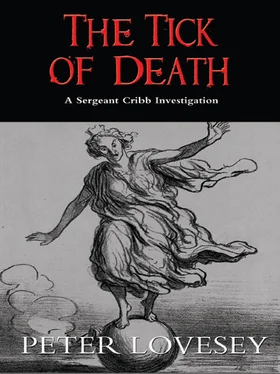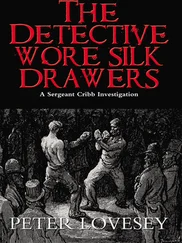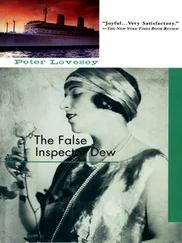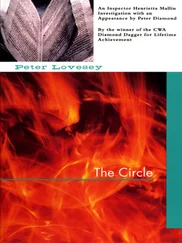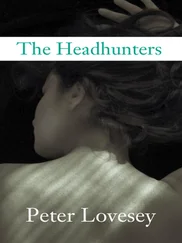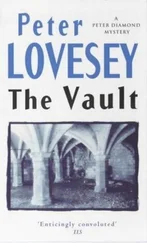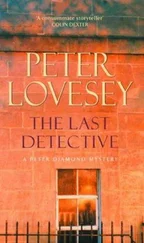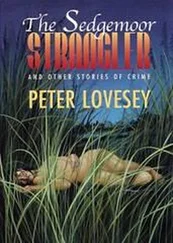Peter Lovesey - The Tick of Death
Здесь есть возможность читать онлайн «Peter Lovesey - The Tick of Death» весь текст электронной книги совершенно бесплатно (целиком полную версию без сокращений). В некоторых случаях можно слушать аудио, скачать через торрент в формате fb2 и присутствует краткое содержание. Жанр: Исторический детектив, на английском языке. Описание произведения, (предисловие) а так же отзывы посетителей доступны на портале библиотеки ЛибКат.
- Название:The Tick of Death
- Автор:
- Жанр:
- Год:неизвестен
- ISBN:нет данных
- Рейтинг книги:3 / 5. Голосов: 1
-
Избранное:Добавить в избранное
- Отзывы:
-
Ваша оценка:
- 60
- 1
- 2
- 3
- 4
- 5
The Tick of Death: краткое содержание, описание и аннотация
Предлагаем к чтению аннотацию, описание, краткое содержание или предисловие (зависит от того, что написал сам автор книги «The Tick of Death»). Если вы не нашли необходимую информацию о книге — напишите в комментариях, мы постараемся отыскать её.
The Tick of Death — читать онлайн бесплатно полную книгу (весь текст) целиком
Ниже представлен текст книги, разбитый по страницам. Система сохранения места последней прочитанной страницы, позволяет с удобством читать онлайн бесплатно книгу «The Tick of Death», без необходимости каждый раз заново искать на чём Вы остановились. Поставьте закладку, и сможете в любой момент перейти на страницу, на которой закончили чтение.
Интервал:
Закладка:
‘So that was why you kept a cool head?’
‘In a nutshell, miss. I’ve got a strong instinct for survival, but I don’t like getting wet unnecessarily.’
‘Do you know why I shot Malone?’
‘Because he panicked?’
‘Yes-and because he was of no further use to us. There was nothing he could do that you could not do equally well. Perhaps better.’
She eyed him with such intensity over the fork that he decided it was time to divert the conversation. ‘I’m not much good at hammer-throwing.’
‘Nor was he. Paddy Devlin is the hammer-thrower. Malone needed an alibi, being Irish-American. You don’t. When we’ve all had some rest, I’ll tell Papa of the part you played tonight. I don’t think he’ll entertain doubts about you much longer.’ She began fingering the fastening at the back of her hair. ‘It’s time I was in bed, Mr Sargent. I’m suddenly quite tired. But not displeased. I hope you are not.’ On cue, her hair cascaded over her shoulders, gleaming red and gold in the early morning sun.
‘On the contrary,’ said Cribb spiritedly.
‘Might I ask one favour of you before I go-to share a secret with me? I told Patrick that Malone turned the gun on himself tonight-from shame, you see-and I shall tell my father the same. I don’t deserve it, but please may I count on you?’
Cribb gave a solemn nod.
Considering his situation, he slept well, disturbed only by occasional unfamiliar sounds from the drive below his window. The latest of these, the rasp of carriage-wheels, drew him from bed. From between the curtains, he watched the manservant struggling to unload a portmanteau from the roof of the four-wheeler. One portmanteau was much like another, but Cribb was privately satisfied it was the one he had seen and left alone in Malone’s room in the Alcazar Hotel. Someone had been remarkably quick to take account of the night’s events.
He turned from the window. There was sufficient light without drawing the curtain to permit a more thorough examination of the room than he had made on being shown into it eight hours before. The shape was determined by one of the twin gables fronting the house; a man of his height had to keep to the middle or duck his head. But it was still furnished more lavishly than any police section-house he had slept in. Discipline in the Force was not to be undermined by brass bedsteads with feather mattresses, marble washstands and Turkish carpets. Cribb did not feel threatened by a few creature comforts. Not even a dressing-table.
It stood in the corner farthest from the door, white in colour, with sprays of forget-me-nots painted on it. The skirt of white muslin that should have been suspended from the edge of the table-top had been removed, perhaps out of regard for the feelings of the new occupant, and the legs underneath looked disturbingly exposed. There was a square mirror above, with adjacent flanking mirrors. Cribb approached to a position where he could see himself in triplicate. The profile on the left, he decided, had a shade more of the dynamiter in it than the full face or the opposite profile, particularly when he pushed his lower lip forward. It was still difficult to think of himself as Malone’s replacement. He decided to look again when he had changed out of his borrowed nightshirt. Some clothes had thoughtfully been left out for him.
There was a cold luncheon waiting when he got downstairs and found the dining room. The factotum served it without a word, and withdrew, leaving him to help himself to cheese and fruit. He enjoyed an unhurried meal, and ventured through the adjoining conservatory into the garden. Noticeably overgrown lawns sloped from the house to an orchard, beyond which gleamed the Thames. Hearing a slight cough, he strolled in that direction.
‘Ah, Mr Sargent,’ said Rossanna. ‘I was wondering whether we should see you. You feel refreshed. I hope?’
‘Famously, thank you, miss.’
‘Please call me Rossanna.’ She spoke from a hammock slung low between two apple-trees. Dappled sunshine played over her gently oscillating form, dressed for the afternoon in ivory-coloured cotton lawn, trimmed with lace. Her father sat nearby in his invalid chair, a wide-brimmed straw hat angled so that it obscured the top of his mask, without interfering with his vision. ‘And have you taken lunch?’
‘I have, thank you.’
She smiled in that way that, rightly or wrongly, seemed charged with ulterior meanings. ‘Then you cannot possibly have anything to do but talk to me. It is time we got to know you better, don’t you agree? If you go back to the conservatory, you will find a cane chair. Bring it out in the sunshine, Mr Sargent, and place it just there under the tree, where we both can see you.’
He was not deceived by the casual charm of the invitation, nor the setting. Every move he had made since coming downstairs had been artfully contrived to get him into the garden in a compliant frame of mind. She had staged it all: the solitary meal, the open door into the garden, the cough to catch his attention, McGee silently present, herself indolently posed in the hammock, waiting for him. It was different only in detail from being dragged struggling into a room and roped to a chair. The interrogation in the next two hours was no less searching or persistent. Her thoroughness in extracting every detail of his story would have provided an object-lesson for any aspirant to detective work. The Clan-na-Gael was not proposing to admit a novice to its ranks without first sifting his personal history over and over for the possibility of deception.
Cribb, for his part, was not unprepared. He had decided to apply a principle that had served him well in his selection interview for the C.I.D. six years before. He would give so much prominence to the things his questioner wanted to hear that anything adverse would be crowded out. Of course, it was difficult crowding out an entire career in the Force, as distinct from a few minor insubordinations, but the principle was there. After a substantially accurate account of his childhood, he waxed eloquent about his army days, making three years sound like the greater part of his life. From there, he moved deftly on to his career as a mercenary, careful not to include any detail that could betray him. His knowledge of dynamite, he explained, was gained in Paris, in service with the anarchist movement. The names of Kropotkin and Malatesta rolled from his tongue as naturally as the words of the official caution to prisoners-thanks to some profitable reading at Woolwich. In 1882, he said, he had severed his links with the Black International, after the arrests of Cyvogt and Kropotkin, and returned to London.
If Cribb thought his recital was over, Rossanna did not. She continued to press him for more information, verifying dates, names and places. The questions followed no logical sequence, but tested his story at every conceivable point. He was forced to take chances, and more than once faltered and desperately hoped she and father would put it down to lapses of memory.
‘Thank you, Mr Sargent,’ she finally said. ‘You must think me the most inquisitive woman alive.’
‘Good Lord, no, miss,’ Cribb gallantly replied. ‘Anyone in your father’s position is entitled to make reasonable inquiries about a person in his employment, and I’m sure you were putting the questions on his behalf. I’m a professional man. I don’t object to such procedures.’
She smiled. ‘Then you will understand that I must now confer with my father. Would you be so kind as to help me to the ground?’
He took her hands and drew her forward. She swung her legs clear of the hammock and stood upright, so that he felt the touch of her dress against his legs. He made to take a discreet step back, but she continued to hold his hands, momentarily detaining him. ‘You are more than kind,’ she said, and then went to McGee.
Читать дальшеИнтервал:
Закладка:
Похожие книги на «The Tick of Death»
Представляем Вашему вниманию похожие книги на «The Tick of Death» списком для выбора. Мы отобрали схожую по названию и смыслу литературу в надежде предоставить читателям больше вариантов отыскать новые, интересные, ещё непрочитанные произведения.
Обсуждение, отзывы о книге «The Tick of Death» и просто собственные мнения читателей. Оставьте ваши комментарии, напишите, что Вы думаете о произведении, его смысле или главных героях. Укажите что конкретно понравилось, а что нет, и почему Вы так считаете.
